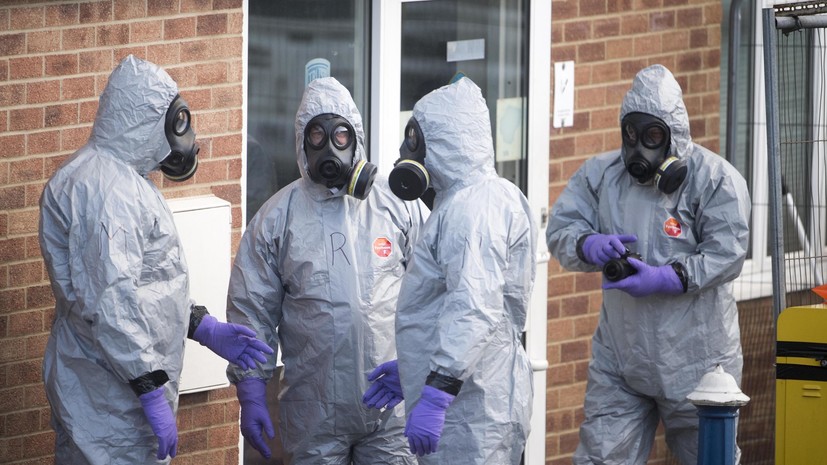The United Kingdom responded by refusing requests from the General Prosecutor's Office of Russia for legal assistance in the investigation of the criminal case concerning the infringement of the life of GRU former employee Sergei Skripal and his daughter Julia. This was reported at the Russian Embassy in London.
"In support of the refusal, the British side refers to Article 2 (b) of the European Convention on Mutual Assistance in Criminal Matters of 1959. According to this clause, "assistance may be refused if the requested party believes that the execution of the request may damage sovereignty, security, public order (ordre public - the basis of the rule of law) or other essential interests," the embassy said in a statement.
As reported in the diplomatic mission, the letter notes that the decision to refuse was taken "at the highest political level."
"Such a position of the British authorities does not allow bringing the investigation to its logical conclusion neither within the framework of the British, nor within the framework of the Russian legal framework. Thus, the British side confirmed that the campaign it launched around the poisoning of Sergei and Yulia Skripaly pursued purely political and propaganda goals. It has nothing to do with the desire to establish the truth in the case and bring the perpetrators to justice, "Russian diplomats stressed.
"Rhetoric in the style of highli lycli"
At a meeting of the UN Security Council in New York, Russian Foreign Minister Sergei Lavrov called on London to establish a constructive dialogue with Moscow on the case of the Scribles in order to establish the truth.
"There is an unsubstantiated - in the style of haylie lycli - rhetoric in connection with the" Salisbury case ". At the same time, the UK stubbornly shies away from the joint investigation that we repeatedly offered ... The question arises: if they do not want to cooperate, then there is something to hide? "- said the minister.
He commented on the statements of British Prime Minister Theresa May, who, speaking at the UN Security Council, accused Russia of using chemical weapons in Salisbury.
"Theresa May is not the first time to make such accusations and every time she arrogantly declares that they have one hundred percent proof. But they do not present them to anyone, they violate the provisions of at least three or four conventions - bilateral, Russian-British, and multilateral within the Council of Europe - on the need for such cases to directly engage in dialogue and discuss the current situation, "the minister said.
As noted in the Russian embassy, the charges, which are not backed up by evidence, are used to "stir up anti-Russian sentiments" in the UK, as well as to isolate Russia on the international scene.
New "evidence"
Recall, London believes that Russia is involved in the poisoning of violins with substance A-234, but there is no evidence of guilt in Moscow. The British authorities do not react to diplomatic notes with an appeal to provide access to the investigation and the injured Russians.
"Refusal to satisfy the requests of the Prosecutor General's Office of Russia has become another breach of the international legal obligations of the UK ... We are sure that the responsible members of the international community will appreciate this conservative government's line. It illustrates the true value of statements about Britain's leadership in maintaining a "rule-based world order" and about turning the country into a "global Britain", tuned to constructive cooperation with foreign partners, "the Russian embassy concluded.
Against this background, the Western media have shown yet another "proof" of Russia's guilt in poisoning the Violins. The Bellingcat and The Insider stated that Ruslan Boshirov, whom London calls a suspect in the Salisbury incident, was allegedly a member of the GRU and Hero of Russia, Anatoly Chepiga. "Several sources familiar with the person and / or the investigation confirmed the identity of the suspect," the authors of the joint material assert.
In September, The Bellingcat and The Insider, referring to the "FMS base," reported a possible connection with the GRU Boshirova and another suspect in the case of Alexander Petrov.
Previously, these same publications have put forward their version of the catastrophe of the Malaysian Boeing, according to which the weapons that the aircraft destroyed were allegedly imported from Russia. Commenting on the results of the investigation of The Bellingcat, the Defense Ministry noted that the provided photo and video materials were retouched: images of the "Buka" were mounted in the record.
The new publications of The Bellingcat and The Insider about the alleged real name of the "suspect" in the Ruslana Boshirova case were officially announced by the official representative of the Russian Ministry of Foreign Affairs Maria Zakharova as a throw-in and a continuation of the campaign to divert attention from what happened in the British Salisbury.
"A new injection by Petrov and Boshirov was carried out immediately after the speech of Therese May in the UN Security Council on the topic of weapons of mass destruction, during which she again voiced accusations against Russia," she wrote on Facebook.

